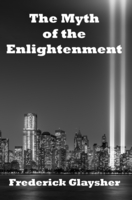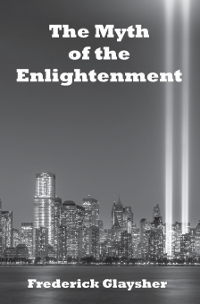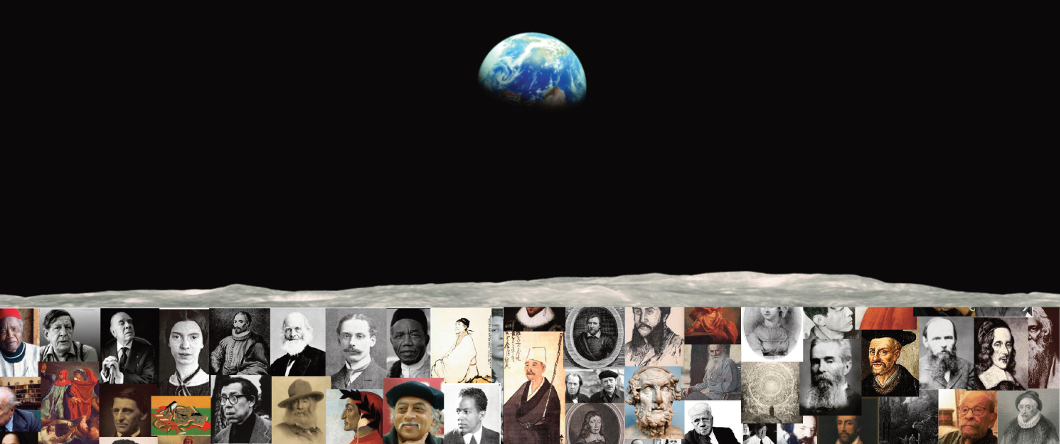The Myth of the Enlightenment: Essays
By Frederick Glaysher. Hardcover. $30.00. ISBN: 9780982677834. Preface. Earthrise Press, 2014; 2024 Revised Edition. 230 pages. Two new essays, one on John Ellis' The Breakdown of Higher Education and one on the ancient Greek rhapsodes. Printed in the USA, UK, Australia, India.
BUY on Ingram Book Company's Shop Lightning Source (Please do not buy The Myth on Amazon. I've lost control of my books on Amazon and it has sold corrupted copies of The Myth in the past. Details on About))

Or USA: Bookshop.org Holiday Special Discount of 15% off, use LOVEBOOKSELLERS in the checkout cart.
UK: UK.Bookshop.org, Kobo (ebooks), Order Books
 The Myth of the Enlightenment is divided into four sections of essays and reviews, all written during the 21st Century, with many of them central to his evolving intellectual and spiritual struggle to write his epic poem, The Parliament of Poets.
The Myth of the Enlightenment is divided into four sections of essays and reviews, all written during the 21st Century, with many of them central to his evolving intellectual and spiritual struggle to write his epic poem, The Parliament of Poets.
These essays open up Glaysher’s own biography and  his life-long interest in the writings of Plato, Leo Tolstoy, Rabindranath Tagore, John Milton, Saul Bellow, Robert Hayden, and other poets and writers, offering a fresh, new vision for literature and culture...
his life-long interest in the writings of Plato, Leo Tolstoy, Rabindranath Tagore, John Milton, Saul Bellow, Robert Hayden, and other poets and writers, offering a fresh, new vision for literature and culture...
Reviews
"In short this is a book I'll be returning to for the rest of this year and no doubt afterward. I'm glad it exists and I'm grateful for the wisdom it sends my way." —Laurence Goldstein, Department of English, University of Michigan
“In an era in which the value of human life has become as precarious and narrow as the study of the humanities itself, we need Glaysher’s voice more than ever.” —Phillip M. Richards, Department of English, Colgate University author of Black Heart: The Moral Life of Recent African American Letters
"It is clear to me that Glaysher’s scholarship, his poetry, and his hopeful vision of Unity among people of all lands remain grounded in ever-dawning encounters with the Divine." —Bob Dixon-Kolar, Department of English, College of DuPage
"Honors the old literary masters, East and West, while exploring the deepest corners of spirituality and its implication for ameliorating the conditions of modern humanity. Reading each essay, whether it be Rabindranath Tagore, Saul Bellow, Tolstoy, or Robert Hayden, as examples, feels like entering into the secret chambers of the writer’s consciousness struggling “with what is universal in the human being”—struggling to express the universality of the human spirit:
Now more than ever, after centuries of falling down into the bottomless pit of nihilism, the world needs to recover the vision of universality, what the great religions and people of various centuries and cultures have in common. For all too long, humanity has obsessed with what distinguishes and separates, what divides people from one another, setting up our little racial, nationalistic gods and idols….Universality embraces all persuasions and transcends them. That is the great challenge.
"This quest is, as Glaysher clearly reveals, the never ceasing search for creative unity to which he and many others have given over their life, through their thoughts, words, and actions. The essays in this book aim for the author’s highest vision; that is, an attempt to “embody and represent the fullness of human reflection,” an inclination intended not just for academics, but a voice for all, and one that speaks to our time. And to that end, Glaysher has allowed himself to draw “from the soil of literature and culture whatever they need to produce and sustain their fruit.” In talking about his relationship with Robert Hayden, Glaysher tells us, “his own poetry had worked its way deep in to my consciousness.” I cannot think of a better way to describe how this book impresses itself on the reader; if there are millions of people waiting for a sign, as Allan Bloom is cited as saying, then this book is assuredly evidence of what such a sign looks like." —New Consciousness Review, Portland, Oregon
"Opens up some potentially fascinating and educationally rewarding terrain. The Myth of Enlightenment is a rich tapestry of insight and personal reflection which many poets and lovers of a free world will gladly embrace." —Spirituality Today, UK
Contents
Contents
Preface ix
I The Myth of the Enlightenment
“Of True Religion” by John Milton 13
Tolstoy and the Last Station of Modernity 17
Leo Tolstoy’s Hadji Murad 30
The Poet’s Religion of Rabindranath Tagore 33
Tagore and Literary Adaptation 55
Saul Bellow’s Ravelstein—Closing of the American Soul 60
Decadence, East and West 66
The Post-Gutenberg Revolution—A Manifesto 83
The Quantum Physics of the Soul 97
The Search for Universal Spirituality 101
The Universality of One World 115
Tolstoy’s Universality 121
II Reviews
The American Scholar and the Decline of the English Department 129
Ben Jonson’s Bartholomew Fair 136
Fang Lizhi and Human Rights in China 138
Bitter Winds, Indeed 141
Global Tragedies of Our Own Making 144
John Ellis, The Breakdown of Higher Education 146
III Interviews, Epic Poetry
Interview of the Author of The Bower of Nil 157
Aristotle’s Poetics and Epic Poetry 165
My Odyssey as an Epic Poet: Interview 169
A Socratic Dialogue on Rhapsodes and Peace 179
IV Race in America
Robert Hayden Under a High Window of Angell Hall 193
Robert Hayden’s Angle of Ascent 206
A Courageous Man and a Brilliant Book 212
White Guilt. Shelby Steele 213
Reawakening the Dream. Shelby Steele 216
The Quest for Cosmic Justice. Thomas Sowell 218
Black Rednecks and White Liberals. Thomas Sowell 220
Winning the Race. John McWhorter 225
FROM the Preface
For over three-hundred years, civilization has been under the sway of the Myth of the Enlightenment. While the Enlightenment initiated a highly beneficial movement away from autocratic government and religion, a stifling reliance on past authorities, accompanied by an ever-increasing scientific and practical development, very early on stress and cracks began to be felt in the structure of the psyche and society. The twentieth century witnessed those cracks transmogrifying into crevasses of gaping and violent proportions, often circling the globe.
The last few decades have borne all the more testimony that the Myth of the Enlightenment has become part of the problem and no longer sufficiently comprises what is needed to resolve and heal what civilization is suffering from.
Speaking broadly, to reach the imagination of the entire culture, the cultural richness and plenitude of the humanities are essential and must include all of the religious and wisdom traditions. Story, myth, and drama reach the deepest into the psyche, as Carl Jung, Joseph Campbell, among others, understood, as they had learned from the greatest works of art and myth that were in fact at the core of their own studies...

